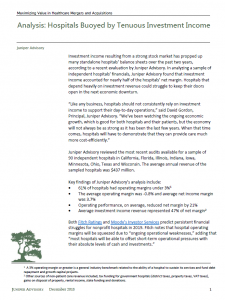Analysis: Hospitals Buoyed by Tenuous Investment Income
 Investment income resulting from a strong stock market has propped up many standalone hospitals’ balance sheets over the past two years, according to a recent evaluation by Juniper Advisory. In analyzing a sample of independent hospitals’ financials, Juniper Advisory found that investment income accounted for nearly half of the hospitals’ net margin. Hospitals that depend heavily on investment revenue could struggle to keep their doors open in the next economic downturn.
Investment income resulting from a strong stock market has propped up many standalone hospitals’ balance sheets over the past two years, according to a recent evaluation by Juniper Advisory. In analyzing a sample of independent hospitals’ financials, Juniper Advisory found that investment income accounted for nearly half of the hospitals’ net margin. Hospitals that depend heavily on investment revenue could struggle to keep their doors open in the next economic downturn.
“Like any business, hospitals should not consistently rely on investment income to support their day-to-day operations,” said David Gordon, Principal, Juniper Advisory. “We’ve been watching the ongoing economic growth, which is good for both hospitals and their patients, but the economy will not always be as strong as it has been the last few years. When that time comes, hospitals will have to demonstrate that they can provide care much more cost-efficiently.”
Juniper Advisory reviewed the most recent audits available for a sample of 90 independent hospitals in California, Florida, Illinois, Indiana, Iowa, Minnesota, Ohio, Texas and Wisconsin. The average annual revenue of the sampled hospitals was $437 million.
Key findings of Juniper Advisory’s analysis include:
- 61% of hospitals had operating margins under 3%
- The average operating margin was -0.8% and average net income margin was 3.7%
- Operating performance, on average, reduced net margin by 21%
- Average investment income revenue represented 47% of net margin
Both Fitch Ratings and Moody’s Investor Services predict persistent financial struggles for nonprofit hospitals in 2019. Fitch notes that hospital operating margins will be squeezed due to “ongoing operational weaknesses,” adding that “most hospitals will be able to offset short-term operational pressures with their absolute levels of cash and investments.”
However, Gordon warns, “no hospital should take comfort in positive financial metrics driven by investment returns. Complacent hospitals can quickly find themselves at risk of insolvency during the next recession.” Portfolio losses are a real threat to many hospitals. Recent stock market declines underscore the volatility of the US economy, which is in one of the longest periods of expansion in its history. Experts are already forecasting the next economic decline in outlets like the Wall Street Journal, Washington Post, New York Times, and Forbes. While Juniper’s analysis focused on standalone hospitals, health systems have also been bolstered by investment income. The findings reaffirm the need for hospitals to improve efficiency, cut avoidable costs and partner in order to operate sustainably in the near- and long-term.